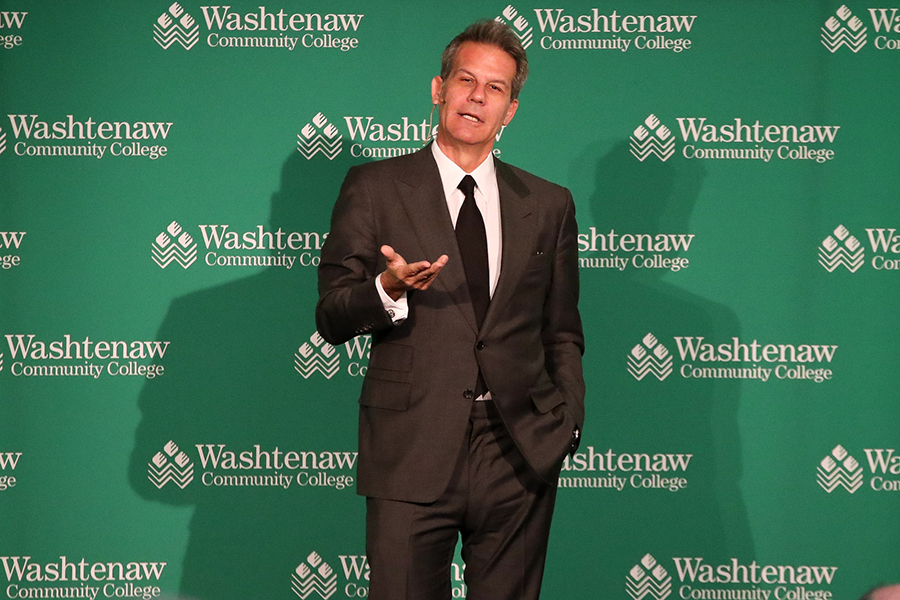
Author and urbanist Richard Florida provided an audience of local business and political leaders with decidedly Dickensian commentary: It is the best of times locally in finding solutions to problems and the worst of times nationally in finding solutions to almost anything.
“Don’t pay attention to the national political scene. Look at what’s going on locally,” he said. He noted that surveys show less than 30 percent have faith in the federal government while 85 percent have faith in their local government.
“You are at the center of it,” Florida told the roughly 100 attendees at the Washtenaw Community College’s annual President’s Leadership Recognition Luncheon on Tuesday, Feb. 18. “This is the best economy because it’s coming from the bottom up,” through local talent and creativity.
“The energy we are seeing that is transforming our society, socially and economically, is right here,” he said. “Community colleges are the heart and soul of it and don’t get the credit they deserve.”
RELATED: View more photos from the event
Florida cited statistics that bear witness to the staggering transition from a predominantly farm economy of the early 1900s, to a manufacturing economy mid 20th century, to today.
As recently as 1950, he said, over half of Americans worked in factories. By 1980, the U.S. economy began to diverge. “Between 1980 and today,” he said, “we’ve created more than 25 million jobs in the creative sector—science, technology, research, education, engineering, business, management, healthcare, arts, design, culture and music.
“We are shifting from an old industrial economy to a new knowledge or creative economy where the mind is the means of production. It’s human creativity.”
Florida noted that The U.S. has a shrinking middle class but sounded a note of optimism: “We no longer have a middle class but what goes on here and at other community colleges will create a new middle class of skilled workers.”
Florida, author of “The Rise of the Creative Class” and “The New Urban Crisis,” said his research shows that Ann Arbor is now the number four city, out of 385 cities studied, on the cutting edge of a new economy. It is the “epicenter,” he said, of an economy driven more by creativity than old standards of manufacturing and natural resources.
He said, clusters of knowledgeable people occur when there is proximity to a great international airport and a great grouping of higher education institutions.
Florida pointed to the three “Ts” that are a mark of the successful community. “It’s tech, talent and tolerance,” he said. Ann Arbor has all three, he added.
Community colleges, which he referred to as “anchor institutions” always have been involved in serving local business and industry needs.
“The demands on the workforce are incredible,” he told the audience. What new employees have to know to work in almost any job requires education.
He also pointed out that community college enables kids of all backgrounds to find their passion and build their lives.
As a consultant on urban planning in cities across the nation, Florida singled out local leaders of every political stripe who understand how to solve local issues.
“I can’t tell the political affiliation of the mayors I’ve met,” he said. “They are pragmatic and they know how to get things done.”
Florida, who is a researcher and professor at the University of Toronto’s School of Cities and Rotman School of Management, shared his life’s experience with education. His father, he said, never went to high school, going to work at age 13 in an eyeglass factory in Newark, NJ. His mother was an ad taker at the Newark Star Ledger.
Taking advantage of a scholarship, he enrolled at Rutgers University in his home state. “Rutgers changed my life,” he said.
It was a course in urban geography that piqued what would become his life’s work. Assigned a project to write about what he saw in New York City, a whole new world of vibrant neighborhoods, peopled by musicians, artists and hippies, opened up to him.
Florida closed his talk with successes he is seeing in cities that went through the toughest of times—Newark, Pittsburgh and Detroit—that are or already have re-invented themselves.
But its creativity, fueled by education, that continues to be the key to economic transformation, he said.
---
Special thanks to our President’s Leadership Recognition Luncheon sponsors for their generous support: A.F. Smith Electric, Inc.; Albert Khan Associate, Inc.; Applied Imaging; Ellucian Managed Services; Plumbers & Pipefitters Local Union 190; University of Michigan Credit Union and Zingerman’s.
Tags: Community Colleges, President's Leadership Recognition Luncheon, ousearch_News_2020
